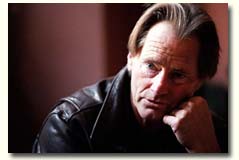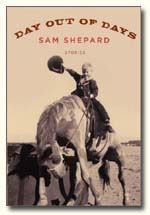|
The iconic actor and writer is in the midst of a
cultural moment with a new play opening, another one in
revival, and a book of fiction set in the American West
just out.

Once a cowboy always a cowboy? The cover of Sam
Shepard’s new story collection, Day Out of Days, shows a
family photo of little Sam at about 6, a fair-haired boy
on a horse many times his size waving a cowboy hat. You
can still feel the dusty air of the West in his work.
But Shepard is 66 now—strange but true. The chiseled,
movie-star face that made women swoony watching Days of
Heaven back in 1978 looks weathered. And this book and
his new play, Ages of the Moon (which opened last week
at the Atlantic Theater Company) tell us he’s hyperaware
of heading toward geezerville. The stories’ fictional,
Sam-like narrator criss-crosses the country’s highways,
stopping at motels, and wonders, “How does this happen?”
meaning life, aging, change. The two men in Ages of the
Moon are friends at the bitter end of middle age,
meeting in a country cabin to mourn their lost loves.
Who knows if Shepard’s feeling old these days? But no
one can call him worn-out.
Don’t worry, though. As a writer Shepard is not nearly
in the land of the has-been. These deceptively modest
works, reflective and witty, explode with fresh energy.
Their touches of absurdity give way to a depth of
emotional loss that will sneak up and wring your heart
dry. He’s still a star, still a treasure.
And we are having a Shepard moment. An off-Broadway
revival of A Lie of the Mind, one of his big plays about
loony violent families, is about to land in a production
loaded with indie-hip cred: directed by Ethan Hawke,
starring Keith Carradine and Josh Hamilton (previews
begin January 29).

Shepard's vintage plays hold up, but this is a moment to
appreciate his new works, of a piece with each other:
haunting stories a page or so long, a multi-layered,
two-character play that runs a swift hour and a quarter,
all about guys who have really lived.
His recent plays, The God of Hell and Kicking a Dead
Horse, had a vital political edge. Ages of the Moon is a
personal, character-driven piece, with the amazing,
hang-dog-faced Stephen Rea (has he ever overacted in his
life?) as Ames, who has called his white-haired pal
Byron (Irish actor Sean McGinley) to visit him. Ames is
in distress because his wife has bolted after learning
of his one-night stand with a woman Ames hardly
remembers.
Sitting on the porch, talking in the rhythms and with
the existential shrug of Beckett characters (“What are
we gonna do?” one of the them says. “There’s nothing to
do,” the other answers) they raise their glasses to
drink like a couple of synchronized swimmers. (The
production, which originated at the Abbey Theater in
Dublin, is directed with perfect timing by Jimmy Fay.)
In the flashier role, Rea gets to sing snatches of "King
of the Road" and "The Halls of Montezuma"; he takes a
rifle and shoots down an annoying ceiling fan, then
stares at it warily as if it’s some half-dead creature
that might jump up and bite him. There’s even a True
West-inflected brotherly wrestling match.
This play is wildly entertaining, yet in the end all the
chaos and fun can’t mask the heartbreaking sadness at
what both men have lost over time.
“You were head over heels,” Byron says of Ames and his
wife.
“I was,” Ames tells him. “I thought it would never end.”
That feeling—knocked out by the impermanence of love—is
echoed in the stories in Day Out of Days. A man whose
wife thinks he’s been cheating (we suspect he has too)
walks with her on the beach “remembering the days when
we were seldom out of each other’s sight and had no
reason to doubt we would be forever in love.”
The central character, on the road throughout these
stories, is not always the same man, but he has a
consistent, familiar voice. As in Shepard’s earlier
collections, these fictions tease, toying with
autobiography. The main character shares plenty with the
author. Sometimes he is an actor on a film set, like
Shepard, playing one more money-making small part as a
gruff military officer. Sometimes he has a son and
daughter with his longtime love. He has fraught memories of his
father. “I thought I had done my level best, done
everything I possibly could, not to become my father,”
one narrator says, only to get lost in a bottle of
tequila and have the old man turn up like an angry ghost
demanding Why?
While these pieces are rooted in the details of the
narrator’s travels, all those cramped rooms where he
lies, “listening to Highway 220 moaning right outside
the sliding glass door,” they often float gracefully
away from realism. The book’s epigraph is from Beckett,
who feels like the guiding spirit as the narrator
grapples with a sense of loss and disconnection, from
other people, even from himself. That dislocation takes
a physical shape in a series of stories about a man who
finds a talking severed head. A couple of those pieces
are told from the head’s point of view. The head
speculates that he and the man who picks him up “might
have become great pals” if the head hadn’t been
“completely cut off as I was.” Well, the Beckett quote
warns that there won’t be neat little stories here. And
that’s all good. Any old realist can give us lifelike
stories. It takes an eternally young genius like Shepard
to make us laugh and wonder what it would mean to be a
detached head, “yearning for home.”
“We used to be young and vigorous,” one of Shepard’s
narrators - a guy with an actual body - says. Who knows
if Shepard’s feeling old these days? But no can call him
worn-out.
|